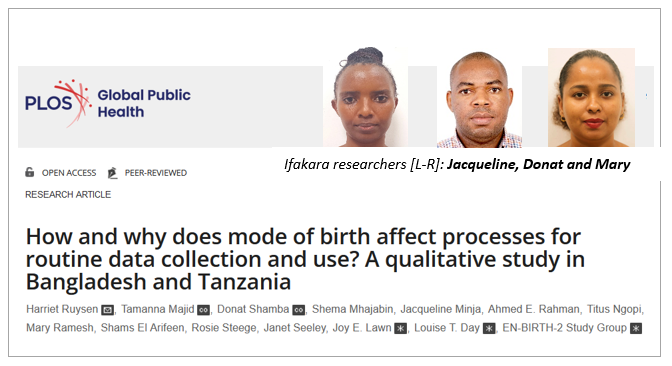
UNVEILED: Critical birth data collection gaps in Tanzania, Bangladesh health systems

The Ifakara Health Institute has been at the forefront of research into how different modes of birth affect routine data collection and use, especially in the public health systems of Tanzania and Bangladesh.
In a recent study published on PLOS - Global Public Health, Ifakara scientists, led by Donat Shamba, from the Health Systems, Interventions, Impact Evaluation and Policy Department, along with their international collaborators, examined the intricacies of data handling during different birth modes.
Their research underscores the importance of adopting a broader perspective to enhance the systems, collection, and use of individual-level data. This approach aims to address the complexities of data aggregation, particularly in scenarios where caesarean births significantly alter the data recording process.
By examining how the mode of birth influences data accuracy and flow, the study – entitled “How and why does mode of birth affect processes for routine data collection and use? A qualitative study in Bangladesh and Tanzania” – provides valuable insights into the challenges and potential improvements in health information systems, advocating for co-designed tools that alleviate the data burden on healthcare professionals.
"Our findings suggest a broader lens is needed to improve the systems, collection, and use of individual-level data for aggregation, not just registers," the scientists conclude with this powerful conclusion in their study conducted in Tanzania and Bangladesh, which investigates how the mode of birth affects routine health information system (RHIS) data collection and use.
Ifakara scientists, international collaborators involved
In addition to Donat, three other scientists - Jacqueline Minja, Mary Ramesh, and Titus Ngopi – from the Health Systems, Interventions, Impact Evaluation, and Policy Department at the Ifakara Health Institute, contributed to this collaborative research. Their in-depth exploration into Tanzania’s health systems offered critical insights into the challenges faced in capturing accurate RHIS data, especially in the context of increasing caesarean birth rates.
This study, led by Harriet Ruysen from the London School of Hygiene & Tropical Medicine (LSHTM) in the United Kingdom, with equal contributions from Donat Shamba of Ifakara and Shema Mhajabin from the Maternal and Child Health Division, icddr,b, Dhaka, Bangladesh, emphasizes the complex interplay between birth mode and data collection processes.
Members of the EN-BIRTH-2 study group also contributed greatly to this work. Every Newborn-BIRTH study involved observing births using an innovative tablet-based system to validate data from routine facility registers and women’s survey report. The study was coordinated by a team at LSHTM and sponsored by the Children’s Investment Fund Foundation (CIFF).
The research teams conducted extensive interviews with a total of 79 health and data professionals, managers, and leaders (35 in Tanzania and 44 in Bangladesh) to understand how the location, care pathway, and staffing influence data flow and accuracy in both countries.
Study insights, implications
The study reveals that caesarean births significantly alter the routine data collection landscape, creating inconsistencies in data flow and register use, particularly in labour and delivery wards versus operating theatres. Health professionals often find themselves overwhelmed by duplicative data tasks, which detract from their primary clinical responsibilities. These challenges are compounded by electronic data systems, which, while intended to streamline processes, often add to the data burden due to fragmentation and duplication.
Towards “better data for better health outcomes”
Addressing these challenges, the study suggests that improving RHIS systems requires a co-design approach to rationalize data collection, reduce duplication, and enhance data quality. Such improvements are essential for ensuring better quality of care and outcomes, particularly as global caesarean birth rates rise.
The research underscores the importance of collaborative efforts in tackling data collection issues and the pivotal role of Ifakara Health Institute in advancing health system research and innovation. As the world grapples with evolving healthcare needs, these insights provide a roadmap for enhancing data-driven health systems to benefit mothers and newborns alike.
>> Check out the full study, here.
